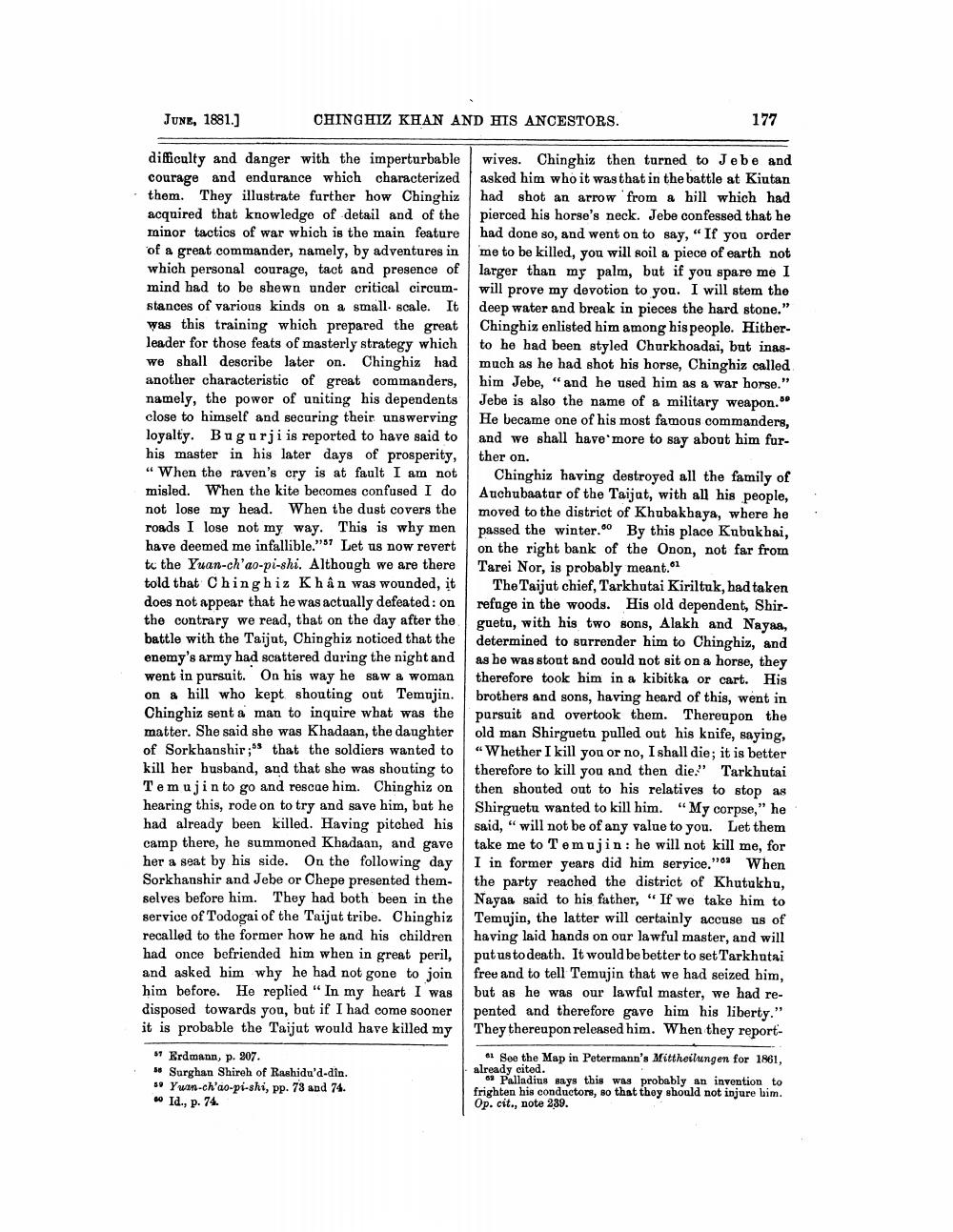________________
CHINGHIZ KHAN AND HIS ANCESTORS.
JUNE, 1881.]
difficulty and danger with the imperturbable courage and endurance which characterized them. They illustrate further how Chinghiz acquired that knowledge of detail and of the minor tactics of war which is the main feature of a great commander, namely, by adventures in which personal courage, tact and presence of mind had to be shewn under critical circumstances of various kinds on a small scale. It was this training which prepared the great leader for those feats of masterly strategy which we shall describe later on. Chinghiz had another characteristic of great commanders, namely, the power of uniting his dependents close to himself and securing their unswerving loyalty. Bugurji is reported to have said to his master in his later days of prosperity, "When the raven's cry is at fault I am not misled. When the kite becomes confused I do not lose my head. When the dust covers the roads I lose not my way. This is why men have deemed me infallible.""" Let us now revert to the Yuan-ch'ao-pi-shi. Although we are there told that Chinghiz Khân was wounded, it does not appear that he was actually defeated: on the contrary we read, that on the day after the battle with the Taijut, Chinghiz noticed that the enemy's army had scattered during the night and went in pursuit. On his way he saw a woman on a hill who kept shouting out Temujin. Chinghiz sent a man to inquire what was the matter. She said she was Khadaan, the daughter of Sorkhanshir; that the soldiers wanted to kill her husband, and that she was shouting to Temujin to go and rescue him. Chinghiz on hearing this, rode on to try and save him, but he had already been killed. Having pitched his camp there, he summoned Khadaan, and gave her a seat by his side. On the following day Sorkhanshir and Jebe or Chepe presented themselves before him. They had both been in the service of Todogai of the Taijut tribe. Chinghiz recalled to the former how he and his children had once befriended him when in great peril, and asked him why he had not gone to join him before. He replied "In my heart I was disposed towards you, but if I had come sooner it is probable the Taijut would have killed my
57 Erdmann, p. 207.
5 Surghan Shireh of Rashidu'd-din.
se Yuan-ch'ao-pi-shi, pp. 73 and 74.
so Id., p. 74.
177
wives. Chinghiz then turned to Jebe and asked him who it was that in the battle at Kiutan had shot an arrow from a hill which had pierced his horse's neck. Jebe confessed that he had done so, and went on to say, "If you order me to be killed, you will soil a piece of earth not larger than my palm, but if you spare me I will prove my devotion to you. I will stem the deep water and break in pieces the hard stone." Chinghiz enlisted him among his people. Hitherto he had been styled Churkhoadai, but inasmuch as he had shot his horse, Chinghiz called him Jebe, "and he used him as a war horse." Jebe is also the name of a military weapon." He became one of his most famous commanders, and we shall have more to say about him further on.
Chinghiz having destroyed all the family of Auchubaatur of the Taijut, with all his people, moved to the district of Khubakhaya, where he passed the winter. By this place Kubukhai, on the right bank of the Onon, not far from Tarei Nor, is probably meant."1
The Taijut chief, Tarkhutai Kiriltuk, had taken refuge in the woods. His old dependent, Shirguetu, with his two sons, Alakh and Nayaa, determined to surrender him to Chinghiz, and as he was stout and could not sit on a horse, they therefore took him in a kibitka or cart. His brothers and sons, having heard of this, went in pursuit and overtook them. Thereupon the old man Shirguetu pulled out his knife, saying, "Whether I kill you or no, I shall die; it is better therefore to kill you and then die." Tarkhutai then shouted out to his relatives to stop as Shirguetu wanted to kill him. "My corpse," he said, "will not be of any value to you. Let them take me to Temujin: he will not kill me, for I in former years did him service." When the party reached the district of Khutukhu, Nayaa said to his father, "If we take him to Temujin, the latter will certainly accuse us of having laid hands on our lawful master, and will put us to death. It would be better to set Tarkhutai free and to tell Temujin that we had seized him, but as he was our lawful master, we had repented and therefore gave him his liberty." They thereupon released him. When they report
61 See the Map in Petermann's Mittheilungen for 1861, already cited.
62 Palladius says this was probably an invention to frighten his conductors, so that they should not injure him. Op. cit., note 239.




